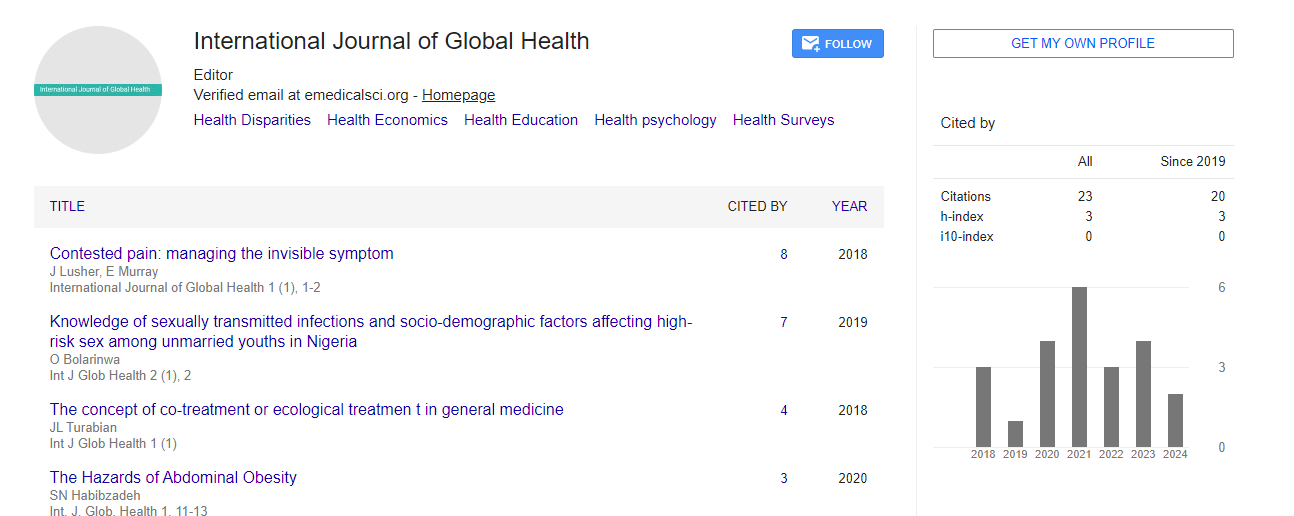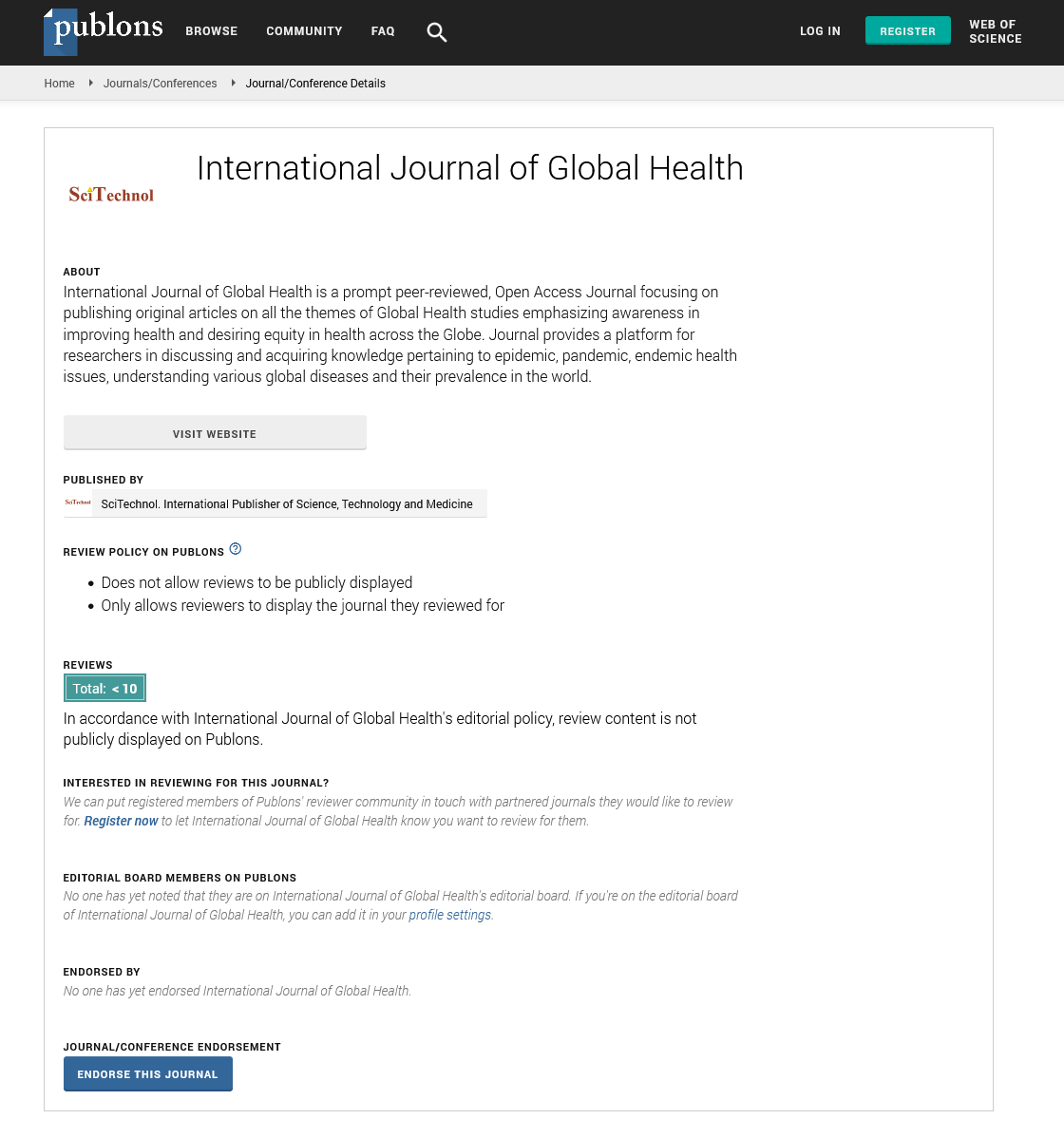Perspective, Int J Glob Health Vol: 6 Issue: 4
Global Health Ethics in the 21st Century: Balancing Progress with Principles
Chao Wheng*
1School of Public Health, Horizon Institute of Medicine, Wellness City, Canada
*Corresponding Author: Chao Wheng,
School of Public Health, Horizon Institute
of Medicine, Wellness City, Canada
E-mail: Wheng_chao478@gmail.com
Received date: 27 November, 2023, Manuscript No. IJGH-24-125948;
Editor assigned date: 29 November, 2023, Pre QC No. IJGH-24-125948 (PQ);
Reviewed date: 14 December, 2023, QC No. IJGH-24-125948;
Revised date: 21 December, 2023, Manuscript No. IJGH-24-125948 (R);
Published date: 28 December, 2023, DOI: 10.4172/Ijgh.1000195
Citation: Wheng C (2023) Global Health Ethics in the 21st Century: Balancing Progress with Principles. Int J Glob Health 6:4.
Description
In the ever-evolving landscape of global health, the ethical dimensions of healthcare practices, policies, and research are paramount. "Global Health Ethics in the 21st Century: Balancing Progress with Principles," as explored in the International Journal of Global Health, delves into the intricate ethical considerations that arise in the pursuit of improved health outcomes on a global scale. Achieving equitable access to healthcare services is a fundamental ethical imperative. The global health community grapples with disparities in access to essential services, medications, and technologies, raising ethical questions about distributive justice and the obligation to address health inequalities.
The conduct of research in diverse global settings necessitates ethical considerations. Issues related to informed consent, cultural sensitivity, community engagement, and the protection of vulnerable populations underscore the importance of upholding ethical standards in global health research. Interventions aimed at strengthening health systems must navigate ethical dilemmas. Balancing the need for improvement with the potential unintended consequences, such as brain drain or the neglect of certain health priorities, requires ethical reflection.
The governance of global health initiatives demands ethical frameworks that prioritize collaboration, transparency, and accountability. Ethical questions arise in the allocation of resources, decision-making processes, and the representation of diverse voices in global health governance structures. The rapid pace of technological advancements introduces ethical considerations in the deployment of innovations such as gene editing, telemedicine, and artificial intelligence in global health. Ensuring that these technologies benefit all populations ethically requires careful scrutiny and ethical guidelines.
Ethical global health practices require inclusive decision-making processes that involve representatives from diverse communities and stakeholders. Prioritizing the voices of those directly affected by health interventions contributes to more equitable and ethical decisionmaking. Global health practitioners must approach interventions with cultural competence and sensitivity. Understanding the cultural contexts of communities, respecting local beliefs, and collaborating with community leaders enhance the ethical implementation of health initiatives.
Building equitable partnerships between high-income and lowincome countries is an ethical imperative. Collaborations should be based on mutual respect, shared responsibilities, and capacitybuilding, avoiding exploitative practices that may undermine local autonomy and sustainability. Ethical global health interventions involve active engagement with communities. Informed consent processes, community participation in research design, and ongoing communication foster trust and ensure that interventions align with the values and needs of the affected populations.
Ethical resource allocation in global health requires a commitment to social justice. Prioritizing interventions that address the most pressing health needs and vulnerabilities contributes to the ethical distribution of resources and promotes health equity. Research in global health demands adherence to ethical principles. Informed consent, protection of privacy, and the inclusion of diverse populations in research studies are critical components. Researchers must navigate the complexities of cultural differences and power dynamics to uphold ethical standards.
Given the dynamic nature of global health challenges, ethical frameworks must be adaptive. Continuous reflection, learning from experiences, and adjusting ethical guidelines in response to emerging issues contribute to the ongoing ethical governance of global health initiatives. Navigating ethical considerations in global health is not without challenges. The tension between achieving progress and upholding ethical principles, potential cultural clashes, and the need for financial sustainability can pose complex ethical dilemmas. Acknowledging and addressing these challenges requires ongoing dialogue, transparency, and a commitment to ethical reflection.
Conclusion
"Global Health Ethics in the 21st Century: Balancing Progress with Principles" emphasizes the intricate interplay between advancing global health goals and upholding ethical standards. Ethical global health practices are foundational to ensuring that progress is not only effective but also equitable and respectful of human rights. As the global health community navigates the complexities of the 21st century, a steadfast commitment to ethical principles remains central to achieving sustainable and inclusive health outcomes for all.
 Spanish
Spanish  Chinese
Chinese  Russian
Russian  German
German  French
French  Japanese
Japanese  Portuguese
Portuguese  Hindi
Hindi 
